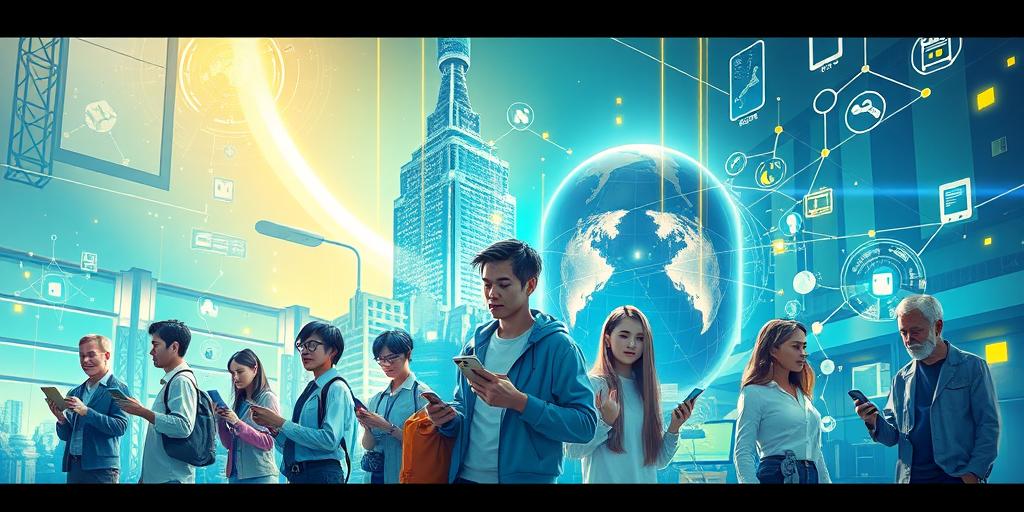Have you ever stopped to think how deeply intertwined digital transformation is with your daily life? From the moment you wake up to the time you go to bed, digital technologies are subtly—and sometimes not-so-subtly—shaping your experiences. This isn’t just about smartphones and social media; it’s about a fundamental shift in how we interact with the world, impacting everything from healthcare to education to the way we work and even how we relax. In this article, we’ll dive into the multifaceted ways that digital transformation impacts our everyday lives, exploring both the advantages and disadvantages of this technological revolution.
The Seamless Integration of Digital Tools in Daily Life
Our reliance on digital tools has become almost second nature. Consider your average day: You likely started by checking your smartphone, catching up on emails, news, or social media. This is digital transformation in action—the seamless integration of technology into the fabric of our everyday routines. This integration extends far beyond simple communication. Think about how you use apps to manage your finances, order groceries, or even control your home’s temperature. These digital tools streamline tasks, making our lives more efficient and convenient. This convenience has redefined our expectations; it’s now commonplace to order products instantly with same-day delivery, receive instant notifications on any number of aspects of our lives, and access information on an unprecedented scale. This evolution has been facilitated by advancements in areas such as cloud computing, enabling companies to scale their operations to meet these demands. This constant connectivity empowers us to stay informed, connected, and in control. It’s a remarkable shift that is constantly evolving, making our daily lives easier and more convenient in ways we may not always fully recognize.
Convenience and Efficiency
The increased convenience and efficiency offered by digital tools are perhaps the most immediately apparent benefits of digital transformation. Imagine a world without online banking, e-commerce, or ride-sharing apps—a world where running errands could take hours instead of minutes. The impact of digital transformation on our day-to-day tasks is remarkable. Tasks once requiring lengthy processes can now often be accomplished effortlessly from our smartphones. This creates significant time-saving, freeing up our schedules for other activities and personal pursuits. The ability to work remotely, facilitated by technology, is another testament to the impact of digital transformation. This increase in flexibility offers greater work-life balance for many individuals.
Enhanced Communication and Connectivity
The impact of digital transformation extends far beyond mere efficiency. The ease of communication provided by technologies has revolutionized our ability to stay in touch with loved ones, business partners, and colleagues, regardless of geographical location. Social media platforms, instant messaging apps, and video conferencing software have broken down geographical barriers, fostering a sense of global community and enhanced interconnectedness. This instantaneous communication has improved coordination across teams and projects, leading to increased productivity and collaboration.
Navigating the Challenges of Digital Transformation
While the benefits of digital transformation are undeniable, it’s crucial to acknowledge the challenges and potential downsides. The pervasive nature of technology brings with it concerns about data privacy, cybersecurity threats, and the digital divide. The ever-increasing amount of data collected by companies raises significant ethical and privacy issues. Consumers need to be mindful of the amount of personal information they are sharing online and to understand how this data is utilized. Maintaining control and privacy in this ever-evolving digital world requires diligence and proactive steps.
Data Privacy and Security
The extensive data collection by digital platforms poses a substantial risk to privacy. Our online activities are constantly tracked and analyzed, raising concerns about surveillance and potential misuse of our personal information. The increasing sophistication of cyberattacks adds another layer of complexity, highlighting the importance of cybersecurity practices and robust security measures. Data breaches, identity theft, and other cybercrimes have become increasingly prevalent in our increasingly digital world. Individual users need to take appropriate steps to protect their personal data. This includes using strong passwords, being cautious about phishing scams, and keeping software up to date.
The Digital Divide
The benefits of digital transformation are not universally enjoyed. A significant digital divide exists between those with access to technology and those without. This gap creates a disparity in opportunities, access to information, and participation in the digital economy. Bridging this divide requires focused efforts to ensure that everyone has equal access to the technology and skills necessary to participate fully in today’s digital society. This gap disproportionately affects low-income communities, rural areas, and older populations. Overcoming this digital divide requires collaborative efforts from governments, educational institutions, and technology companies.
Embracing the Future of Digital Transformation
The ongoing evolution of digital technology promises further changes in how we live, work, and interact with the world. Artificial intelligence (AI), the Internet of Things (IoT), and other emerging technologies will undoubtedly play a significant role in shaping the future. Staying informed and adaptable will be key to navigating this constantly changing landscape. While there are numerous challenges, the potential benefits of digital transformation are enormous. Embrace the opportunities it offers and work towards creating a more equitable digital society for all.
The Role of AI and IoT
AI is rapidly transforming many aspects of our daily lives. From personalized recommendations to smart assistants and autonomous vehicles, AI is becoming increasingly integrated into our daily routines. The Internet of Things (IoT) is creating a more interconnected world, linking everyday devices and appliances to the internet. These advancements offer increased convenience, efficiency, and opportunities for innovation, but they also present challenges. Concerns around job displacement due to automation, potential bias in AI algorithms, and ethical considerations around data privacy remain significant areas of discussion and require careful attention.
Embrace the digital revolution and unlock a world of possibilities. Don’t get left behind—start harnessing the power of digital transformation today!




